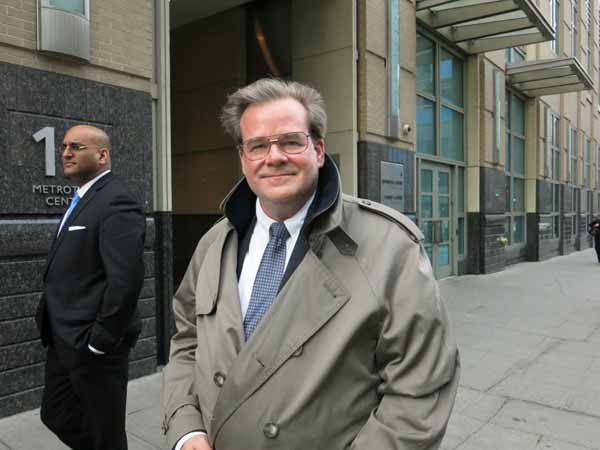Secret documents found stashed in the district attorney’s office show former Park Slope Assemblyman Jim Brennan withheld crucial evidence that may have spared Sunset Park attorney John O’Hara from his notorious wrongful voter-fraud conviction, alleges a new civil suit O’Hara filed against ousted District Attorney Charles Hynes.
The suit claims Hynes directed Brennan to conduct his own investigation into the bogus allegations that resulted in O’Hara being disbarred and disgraced back in 1997 — acting in the place of detectives in order to circumvent laws requiring prosecutors to hand over any exonerating evidence they find to a grand jury.
“It was very cunning,” O’Hara said. “He had Brennan do it off the books.”
O’Hara is suing Hynes and other prosecutors for $25 million for the allegedly malicious conviction that left him branded a criminal for two decades, and was overturned in January following an investigation kicked off by Hynes’s late successor Ken Thompson.
Hynes leveled a seven-count felony indictment against O’Hara in 1996 alleging he voted in the wrong election district, after O’Hara mounted numerous unsuccessful bids for office against the top prosecutor’s allies — including two challenges for Brennan’s Assembly seat.
Throughout it all, O’Hara suspected his runs against Brennan were the cause of his downfall, but it wasn’t until Thompson’s Conviction Review Unit — set up to overturn Hynes’s many wrongful convictions — last year uncovered three boxes of documents from the original case that he finally found proof, he said.
Amongst the documents were notes written by the case’s prosecutor John O’Mara, which allegedly describe Brennan and his staff posing as journalists to question O’Hara’s neighbors and determine which of them would support Hynes’s narrative that he didn’t live at the Sunset Park address he’d registered to vote from, the suit claims.
The notes also allegedly show Brennan spoke to staff at O’Hara’s bank, who notified him that statements were being mailed to the Sunset Park address disputed by Hynes, O’Hara claims.
Had Hynes conducted the investigation using proper protocols, the subpoenas and detectives’ notes would have been turned over to a grand jury, and O’Hara may never have been indicted in the first place, he claims.
Also found among the stashed documents were notes from O’Mara suggesting Hynes offer O’Hara a plea deal to avoid the same kind of civil suit they’re facing now, he claims.
“Discussed the law … [a deal] would foreclose lawsuit for malicious prosecution,” reads the note.
Instead, the case dragged on through three trials, and O’Hara was ultimately barred from practising the law, put on probation for five years, and had to pay a $20,000 fine and perform 1,500 hours of community service.
A 2009 state judicial review found he was the victim of a trumped-up and politically motivated prosecution, and a judge finally cleared O’Hara of the charges this year after Thompson’s team after finding a witness who admitted to providing false testimony during the original case.
Brennan and Hynes could not be reached for comment.


























